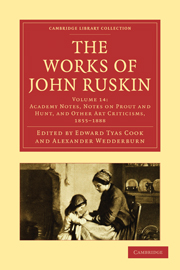Book contents
- Frontmatter
- Contents
- LIST OF ILLUSTRATIONS
- INTRODUCTION TO THIS VOLUME
- PART I “ACADEMY NOTES” (1855–1859, 1875)
- LIST OF ARTISTS AND WORKS MENTIONED IN “ACADEMY NOTES”
- PART II LETTERS AND PAPERS ON PICTURES AND ARTISTS (1858–1887)
- 1 PRE-RAPHAELITISM IN LIVERPOOL (1858)
- 2 GENERALIZATION AND THE SCOTCH PRE-RAPHAELITES (1858)
- 3 JOHN LEECH'S OUTLINES (1872)
- 4 ERNEST GEORGE'S ETCHINGS (1873)
- 5 THE FREDERICK WALKER EXHIBITION (1876)
- 6 ARTHUR BURGESS (1887)
- 7 THE BLACK ARTS. A REVERIE IN THE STRAND (1887)
- PART III NOTES ON SAMUEL PROUT AND WILLIAM HUNT (1879–1880)
- APPENDIX
- Plate section
7 - THE BLACK ARTS. A REVERIE IN THE STRAND (1887)
Published online by Cambridge University Press: 05 February 2015
- Frontmatter
- Contents
- LIST OF ILLUSTRATIONS
- INTRODUCTION TO THIS VOLUME
- PART I “ACADEMY NOTES” (1855–1859, 1875)
- LIST OF ARTISTS AND WORKS MENTIONED IN “ACADEMY NOTES”
- PART II LETTERS AND PAPERS ON PICTURES AND ARTISTS (1858–1887)
- 1 PRE-RAPHAELITISM IN LIVERPOOL (1858)
- 2 GENERALIZATION AND THE SCOTCH PRE-RAPHAELITES (1858)
- 3 JOHN LEECH'S OUTLINES (1872)
- 4 ERNEST GEORGE'S ETCHINGS (1873)
- 5 THE FREDERICK WALKER EXHIBITION (1876)
- 6 ARTHUR BURGESS (1887)
- 7 THE BLACK ARTS. A REVERIE IN THE STRAND (1887)
- PART III NOTES ON SAMUEL PROUT AND WILLIAM HUNT (1879–1880)
- APPENDIX
- Plate section
Summary
1. It must be three or four years now since I was in London, Christmas in the North country passing scarcely noted, with a white frost and a little bell-ringing, and I don't know London any more, nor where I am in it— except the Strand. In which, walking up and down the other day, and meditating over its wonderful displays of etchings and engravings and photographs, all done to perfection such as I had never thought possible in my younger days, it became an extremely searching and troublesome question with me what was to come of all this literally “black art,” and how it was to influence the people of our great cities. For the first force of it—clearly in that field every one is doing his sable best: there is no scamped photography nor careless etching; and for second force, there is a quantity of living character in our big towns, especially in their girls, who have an energetic and businesslike “know all about it” kind of prettiness which is widely independent of colour, and which, with the parallel business characters, engineering and financial, of the city squiredom, can be vividly set forth by the photograph and the schools of painting developed out of it; then for third force, there is the tourist curiosity and the scientific naturalism, which go round the world fetching big scenery home for us that we never had dreamed of: cliffs that look like the world split in two, and cataracts that look as if they fell from the moon, besides all kinds of antiquarian and architectural facts, which twenty lives could never have learned in the olden time.
- Type
- Chapter
- Information
- The Works of John Ruskin , pp. 357 - 364Publisher: Cambridge University PressPrint publication year: 2010First published in: 1904

